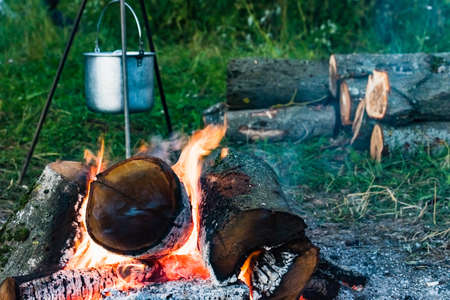Introduction to the Full English Breakfast
The Full English Breakfast stands as a beloved British institution, both hearty and steeped in tradition. A classic “Full English” is more than just a meal—it’s a cultural ritual, often enjoyed on leisurely weekend mornings or during special gatherings. Characterised by its generous array of components, this breakfast typically features crispy back bacon, fried eggs, plump sausages, baked beans, grilled tomatoes, sautéed mushrooms, black pudding, and slices of golden toast. Sometimes hash browns or fried bread join the spread for an extra touch of indulgence. Over generations, the Full English has become synonymous with comfort and hospitality across the UK. Whether served in bustling city cafés, rural B&Bs, or around a campfire in the countryside, it symbolises warmth, sustenance, and community—a true taste of British life that connects people to their heritage and to each other.
Gathering Your Campfire Essentials
Embarking on the adventure of preparing a Full English Breakfast in the heart of the British countryside requires some thoughtful preparation. Unlike cooking at home, outdoor cooking comes with its own set of challenges and rewards, making it crucial to choose your equipment and ingredients wisely. Below is a practical guide to selecting the right tools and provisions for a hearty breakfast by the campfire.
Essential Equipment for Outdoor Cooking
| Item | Why It’s Essential | British Countryside Tips |
|---|---|---|
| Portable Campfire Grill or Grate | Ensures even heat and safe cooking over open flames. | Opt for one that’s lightweight but sturdy; check local regulations on fire use. |
| Heavy-based Frying Pan (Cast Iron Preferred) | Retains heat well and distributes it evenly—ideal for sausages, bacon, and eggs. | A cast iron pan develops character over time; season it before your trip. |
| Kettle or Small Saucepan | For brewing tea, boiling water, or heating beans. | An enamel kettle fits the classic British camping vibe. |
| Tongs & Spatula | Makes flipping ingredients easier and safer. | Choose stainless steel for durability in damp conditions. |
| Cool Box or Insulated Bag | Keeps perishables like sausages and eggs fresh until cooking time. | Pack with reusable ice packs to minimise waste. |
| Ceramic Mug & Plate | Adds a touch of British comfort to your meal outdoors. | Ceramic retains heat better than plastic, especially on chilly mornings. |
| Eco-friendly Washing Up Kit | For cleaning up responsibly in nature. | Use biodegradable soap and a scrubbing brush. |
Choosing Ingredients: Classic Components with Outdoor Flair
The backbone of a Full English Breakfast lies in its ingredients. For outdoor cooking, prioritise items that travel well but don’t compromise on tradition. Here’s a breakdown:
| Ingredient | Countryside Selection Tip |
|---|---|
| Sausages (Pork or Cumberland) | Select thick-cut sausages from a local butcher—these hold up better over an open flame. |
| Bacon (Back Bacon Preferred) | Packed in vacuum-sealed pouches keeps it fresher during transit. |
| Eggs (Free Range) | Carry them in a dedicated egg box for protection on rough trails. |
| Baked Beans (Tinned) | Tins are robust for travel; consider ring-pull cans for convenience. |
| Mushrooms & Tomatoes | Select firm mushrooms and vine tomatoes—they’re less likely to bruise en route. |
| Black Pudding (Optional) | If included, slice before you pack to speed up morning prep. |
| Bread (Sliced Bloomer or Crumpets) | A dense loaf travels best; crumpets add a regional twist if space allows. |
| Butter & Oil (for frying) | A small container of rapeseed oil is leak-proof and ideal for high-heat cooking outdoors. |
Practical Packing Advice
- Group ingredients by meal component and store in reusable containers to minimise mess and waste.
- Avoid glass packaging where possible to prevent breakage on uneven ground.
- If wild camping, respect the Leave No Trace principles: pack out all rubbish and clean up thoroughly after your cook-up.
- A thermos with hot water can be handy for an early morning brew while waiting for the fire to catch.
The British Touch: Sourcing Local Produce
If you’re travelling through rural Britain, take advantage of farm shops or village markets along your journey. Not only does this support local producers, but it also enhances your breakfast with truly regional flavours—a nod to the cultural roots of the Full English itself. Preparing ahead ensures your campfire breakfast is not just delicious but also firmly grounded in British tradition and sustainability.

3. Recipes and Cooking Techniques
Step-by-Step Guidance for a Campfire Full English Breakfast
Preparing a Full English Breakfast over an open fire is as much about timing and technique as it is about the ingredients themselves. Here’s how to approach each classic component, ensuring everything is hot and ready together—a hallmark of a proper British fry-up.
Bacon and Sausages
Method:
Begin with the bacon and sausages, as they take the longest. Place a heavy-bottomed frying pan or skillet over the hottest part of your fire. Add sausages first; turn them regularly so they brown evenly and cook through—this usually takes about 10–12 minutes. Next, add rashers of back bacon to the same pan, allowing the fat from the sausages to help with crisping. Cook until golden but still juicy, turning once or twice. Move cooked items to a cooler part of the grill or keep warm wrapped in foil near the embers.
Eggs
Method:
The eggs come next. Use some of the remaining fat in your pan for extra flavour. Crack eggs gently into the pan and let them fry until whites are set but yolks remain runny—a true British preference. For scrambled eggs, stir continuously over gentle heat for a creamy result.
Mushrooms and Tomatoes
Method:
Add halved tomatoes (cut side down) and sliced mushrooms directly to your pan or thread them onto skewers for grilling over the embers. Season with salt and black pepper, and cook until softened and lightly charred—about 5 minutes for mushrooms, slightly longer for tomatoes.
Baked Beans
Method:
Baked beans are best heated in a small saucepan placed at the edge of your fire to avoid burning. Stir occasionally until piping hot, typically 5–7 minutes.
Toast
Method:
For authentic toast, simply place slices of bread on a grill rack over the fire or use a traditional camp toaster if you have one. Flip once for even browning—watch closely, as toast can burn quickly over open flames.
Timing Tips for Perfect Results
The secret to a successful campfire breakfast lies in your preparation sequence: start with sausages, followed by bacon, then eggs, while beans simmer gently nearby. Mushrooms and tomatoes can cook alongside or after meats, depending on space. Toast should be done last so it’s warm and crisp when served. With practice, you’ll soon have every element ready at just the right moment, making your Full English around the fire as satisfying as any high street café.
4. Campfire Breakfast Etiquette and Traditions
Sharing a full English breakfast around a campfire is as much about social connection as it is about the food itself. There are several customs and unwritten rules that help to make the experience both memorable and authentically British, especially when outdoors.
The Unspoken Rules of the Campfire Breakfast
When enjoying a full English breakfast on the campfire, certain traditions often come into play. First and foremost, there is an unspoken etiquette surrounding the roles in food preparation. Typically, everyone pitches in—someone tends the fire, another fries the bacon, while others prepare tea or lay out plates. This collective effort creates camaraderie and ensures no one is left out of the process.
Typical Roles Around the Campfire
| Role | Description |
|---|---|
| Firestarter | Responsible for getting the fire going and maintaining a steady heat for cooking. |
| Bacon Master | Keeps an eye on sausages, bacon, and black pudding, ensuring nothing gets burnt. |
| Tea Brewer | Makes sure everyone has a strong cuppa to start the day. |
| Toast Turner | Manages bread and keeps it golden without charring. |
| Washer-upper | Takes charge of cleaning up afterwards—a vital but often overlooked role. |
Sharing and Serving Customs
It’s common practice to serve up all elements of the breakfast at once, so everyone can tuck in together. Plates are typically filled generously, and there’s a friendly expectation to offer seconds if there’s enough to go around. Passing sauces, butter, and marmalade across the circle becomes part of the ritual, reinforcing a sense of community.
Polite Conversation and Atmosphere
A true British campfire breakfast isn’t rushed. There’s usually plenty of time for relaxed chat—be it light-hearted banter or sharing stories from previous camping trips. Mobile phones are generally set aside in favour of enjoying each other’s company and the sounds of nature. The atmosphere is informal but respectful; everyone waits until all are served before starting to eat, reflecting traditional British table manners even in the wild.
Traditions That Add to the Experience
- Saying “cheers” with mugs of tea before tucking in
- Savouring local ingredients if possible (like regional sausages or farm-fresh eggs)
- Praising the cook—even if things go slightly awry over an open flame
- Tidying up together so no trace is left behind—a nod to both courtesy and environmental stewardship
By following these customs and traditions, a full English breakfast on the campfire becomes more than just a meal—it’s a cherished social ritual that brings people together in true British style.
5. Embracing British Weather and Local Produce
If you’ve ever camped in the UK, you’ll know that the weather can be anything but predictable. Rain or shine, adapting your Full English Breakfast to suit the climate is part of the adventure. On chilly mornings with a persistent drizzle, it’s wise to prepare components that cook quickly—think scrambled eggs instead of fried, or pre-cooked sausages that only need reheating over the flames. A cast iron skillet with a lid becomes invaluable, shielding your breakfast from rain and helping retain heat.
Weatherproof Cooking Techniques
For those damp Lake District mornings, consider building a windbreak with rocks or using your tent’s porch as a sheltered cooking space (always prioritise safety). If you’re facing a classic British summer day—meaning sunshine with a chance of showers—lay out all your ingredients in advance and keep them covered until they’re ready for the pan. For crispier bacon or evenly cooked mushrooms, a portable grill grate over hot embers works wonders even on blustery days.
Sourcing Local Ingredients: A Regional Twist
One of the joys of making breakfast outdoors in Britain is tapping into local flavours. In Devon or Cornwall, try adding hog’s pudding or Cornish bacon to your fry-up. In Yorkshire, source black pudding from a nearby butcher or add grilled tomatoes grown locally. Scottish campers might swap standard sausages for Lorne sausage or include tattie scones alongside their eggs. In Wales, laverbread or cockles can add a unique coastal touch to your morning meal.
Supporting Small Producers and Farmers
Whenever possible, visit village shops and farmers’ markets for your supplies. Not only does this support rural communities, but it also lets you sample regional specialities—smoked kippers from Northumberland or fresh free-range eggs from Cotswolds farms. With each region boasting its own twists on classic breakfast fare, adapting your campfire Full English isn’t just practical; it’s an edible exploration of British culture.
Ultimately, a bit of flexibility and local pride turns every campfire breakfast into a celebration of place and season—raincoat optional but highly recommended.
6. Conclusion: The Lasting Appeal of a Campfire Full English
The enduring charm of the Full English Breakfast lies not just in its hearty flavours and generous portions, but in the ritual itself—especially when prepared and enjoyed outdoors around a campfire. This classic British meal has always been about more than just sustenance; it’s a communal experience, rich with nostalgia and cultural meaning. Gathering around a crackling fire at dawn, friends and family share stories as bacon sizzles and tea steams, connecting generations through a tradition that feels both timeless and deeply comforting.
There is something inherently British about braving the morning chill, donning wellies, and preparing breakfast under open skies—rain or shine. The act of cooking a Full English on the campfire strips away modern distractions and invites us to savour simple pleasures: the smoky aroma of sausages, the golden yolk of a perfectly fried egg, the crunch of toast browned over embers. Each component represents regional pride and personal preference, yet together they form a meal recognised across the nation.
Ultimately, the Full English Breakfast remains cherished because it celebrates togetherness, resilience, and appreciation for good food done well. Whether you’re deep in the countryside or enjoying a seaside holiday, this meal ties people to place, memory, and each other. Around the campfire, these connections feel even stronger—a reminder that some traditions are worth preserving, one satisfying forkful at a time.


